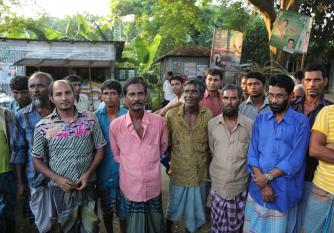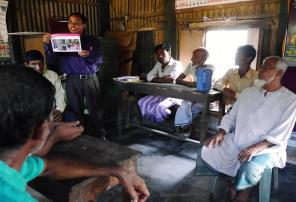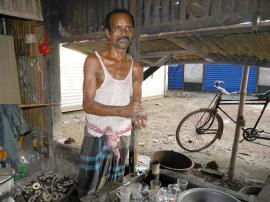IRC and the BRAC WASH programme's efforts in reaching out to men through the tea stall approach as informal meeting spaces for men to talk about hygiene in Bangladesh.
Published on: 29/01/2014
By Ingeborg Krukkert and Sharmin Farhat Ubaid
There are estimated to be around a million tea stalls in Bangladesh and if you want to find a gathering of men with a little time on their hands, a tea stall at the end of the working day is a good place to start. Men who earn their living as day labourers find that a hot, strong and sweet cup of tea is the perfect way to unwind after a hard day's toil.

So the tea stall is where BRAC NGO went looking after finding that many men were missing critical messages on sanitation and hygiene. At these informal social centres, they turn the conversation to the best way to wash your hands and why this is important after defecation and before eating.
The BRAC WASH programme is one of the largest water, sanitation and hygiene programmes delivered by an NGO anywhere in the world and it transforming conditions in Bangladeshi communities. Millions of families acquired hygienic toilets after being convinced of the need to improve the lives of their families and keep water sources safe from contamination.
More than 8,000 BRAC field staff visit communities and work with Village WASH Committees to ensure that every family not only has a hygienic latrine, but uses it. They hold separate cluster meetings with women, men, adolescent girls, adolescent boys and children. During household visits they show families how to gather, store and use water safely, and how to ensure that their latrines function well and there is soap and water for handwashing.
Since the programme began in 2006, the change has been remarkable:

BRAC WASH staff understand that "selling" is more effective than "telling" – they work with members of the household to find solutions. But they find it difficult to reach the men who are missing during household visits or courtyard meetings.
Sharmin Farhat Ubaid, Programme Manager at BRAC WASH, says that reaching-out to men is crucial to ensuring that community members practice safe habits. She set up the tea stall approach with the support of IRC, the Netherlands based WASH specialists after research showed a man-sized gap in the programme. "The studies confirmed that less than half of the men attend cluster meetings in villages and few are home during home visits. In addition, the idea that mothers and children pass on information to the men seldom happened in practice."
The tea stall approach started in 2013 and BRAC has since developed flip charts with key WASH messages. Field and programme organisers find it easier to catch men's attention on technical issues, such constructing a well platform or repairing a water seal, but have to work hard to engage men about hand washing. One way is to promote their role in ensuring that the family can afford to buy soap and that hand washing facilities are in place at the latrine. Once engaged on this more technical front, the discussion can shift to a "hands-on" approach to hygiene!
Upazila (sub-district) manager, Md Ruhul Amin, said: "During house visits, the men cannot spare much time or attention. They are always busy. At the tea stall, they are more receptive and interested. Tea stalls are more like cultural centres."
When drinking tea, it is important to know that the cups are clean and the tea will refresh, not make you ill. As the steam rises and the team stall owner plunges his hands and the cups in and out of hot water and wipes down his stall, the men can be expected to pay attention. And the tea stall owners can also learn.
At one tea stall session, when I asked the owner for his views, he looked around the men crowding out his venue and buying tea and laughed. "It's very good for my business."

Contact Info
At IRC we have strong opinions and we value honest and frank discussion, so you won't be surprised to hear that not all the opinions on this site represent our official policy.